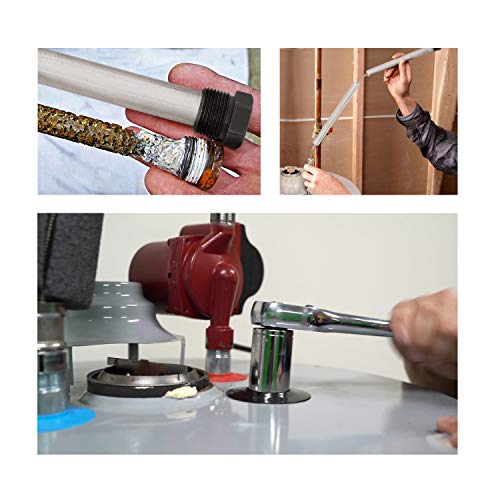Water heaters perform the important function of providing the house with hot water. However, like most appliances, a single unit cannot last forever and has to be replaced after some years.
How long a water heater lasts is determined by a variety of factors. In this article, I provide information on the lifespan of different types of water heaters and also the factors that influence the lifespan of water heaters in general.

Gas water heaters last 8-12 years. Electric water heaters last 12-15 years. Indirect water heaters last 15-20 years. Stainless steel-tanked water heaters last 12-20 years. Glass-lined water heaters last 10-15 years. Tankless water heaters last 15-20+ years.
Average Lifespan of Water Heaters
The lifespan of a water heater is dependent on a variety of factors, two of which are the type of water heater and the material used to build the hot water tank (if the heater has a tank).
| Heater type | Average lifespan |
| Gas water heater | 8-12 years |
| Electric water heater | 12-15 years |
| Stainless steel water heater tanks | 12-20 years |
| Glass-lined and enamel water heater tanks | 10-15 years |
| Tankless water heater | 15-20+ years |
| Storage tank water heater | 10-15 years |
| Indirect water heater | 15-20 years |
Average Lifespan of Water Heater Without Anode Rod

The longevity of water heaters without anode rods is about: 5-8 years. The actual lifespan depends on water hardness, water heater type and quality, when the anode rod was removed, and how hot the water is. In extreme cases, the water heater may only last 3-5 years without an anode rod.
So many factors aside from the anode rod play a role in the longevity of a water heater (we discuss them shortly), so it is difficult to come up with an exact time frame. However, a good way to approach this and arrive at an estimation is to look at how long an anode rod lasts.
Anode rods are, by nature, more reactive than the metal of the water heater. However, they are also smaller and are completely corroded much faster than the tank would be. These two variables can be assumed to balance each other out more or less (but don’t take that assumption as law!).
Anode rods generally last up to 5 years, but they work best if replaced every 3 years.
So, a water heater with a regularly changed anode rod lasts 10-15 years. Water heaters last 8-10 years without having their anode rods replaced regularly. Without an anode rod at all, you can estimate the lifespan of your water heater to be between 5 and 8 years.
Many people are tempted to remove their anode rods to clear up the smelly rotten egg smell caused with well water. Instead, you should replace the rod with a zinc alloy rod, which doesn’t cause the same production of hydrogen sulphide gas.
As anode rods are far cheaper to replace every 5 years compared to a water heater, it is highly advisable to keep the anode rod!
Factors Influencing the Lifespan of Water Heaters
Type of Water Heater
Although they serve the same purpose, all water heater units do not function the same way.
Each type of water heater has its distinct design and mode of operation. So, how long your water heater will last is going to be determined by the type of water heater you use.
For easier understanding, I’ve divided water heaters into two broad categories based on their mode of operation.
- Water storage ability
- Mode of heat generation
Water Storage Ability
The first category focuses on the heater’s ability to store hot water. There are two types of water heaters in this category; the tank and tankless water heater.
Tankless water heaters do not store hot water. They use either a gas burner or an electric heating element to heat water on demand. As a result, tankless water heaters aren’t likely to suffer damage from corrosive water elements and water pressure.
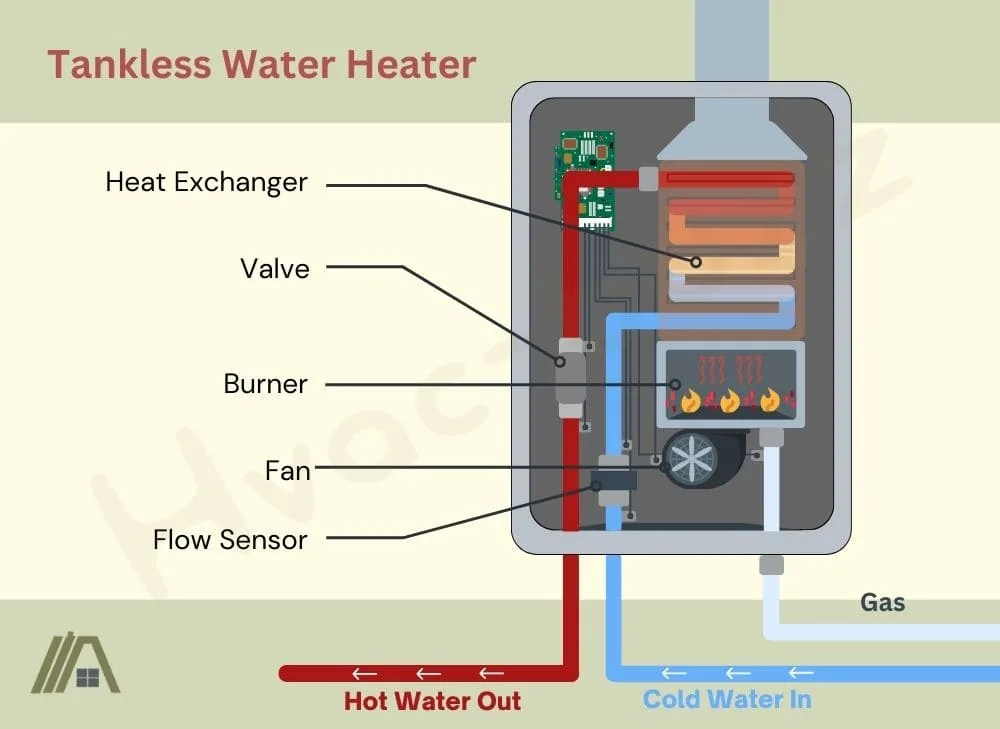
Tank water heaters are popularly referred to as storage tank water heaters. Similar to tankless water heaters, they heat water using either a gas burner or an electric heating element.
However, in addition, they feature an insulated tank that heats and stores water until it is needed. So, it shouldn’t come as a surprise that tank water heaters wear out a lot faster than tankless units.
The average life span of a tankless water heater is 15-20 years, with reports of the heater sometimes lasting longer than the 20-year mark. Storage tank heaters on the other hand have an average lifespan of 10-15 years.
Mode of Heat Generation
Another factor that influences the lifespan of a water heater is the energy source for heating the water.
The operation of a gas water heater is cheaper than an electric water heater. However, the heating system of gas water heaters is under more strain and does not last as long as the electric heating systems. Thus, gas heaters last 3-5 years less than electric water heaters.
There are some water heaters, though these are less common, which are not heated with gas or electricity. Instead, hot water from the boiler is passed through coils that extend into the water heater tank, and the heat is transferred from the water in the coils to the water in the tank. These are known as indirect water heaters.
Because they are not subjected to the extreme heat of a burner or electric element, these heaters tend to last longer than either gas or electric heaters.
The average lifespan of gas water heaters is reported to be between 8-12 years while electric water heaters are said to last between 12-15 years. Indirect water heaters last 15-20 years.
Water Heater Material and Quality
Water heaters are composed of a variety of components and it isn’t very likely that all the parts of the unit would remain in good shape throughout the water heater’s life. Thankfully, some components of the water heater can be replaced whenever they wear out.
One element that cannot be easily replaced is the water heater tank. More often than not, the wearing out of the tank is a clear indication that the water heater is due for a replacement.
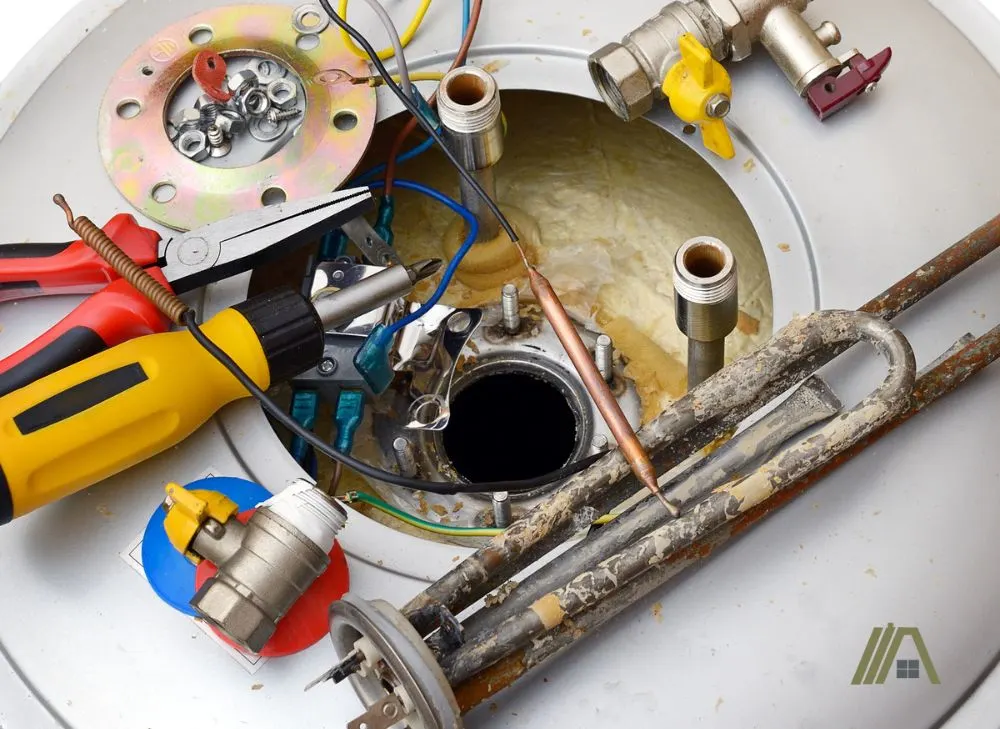
The two major contending materials used for building water heater tanks are stainless steel and glass-lined steel.
Glass-Lined Water Heater Tanks
Glass-lined water heater tanks are built by applying a glass lining to the interior portion of a steel tank. This way, the steel tank is protected against corrosive elements in the water by a corrosion-resistant glass coating.
However, it is just superficial protection and isn’t always 100% penetration-proof. As a result, this type of water heater needs an anode rod for additional protection.
Glass-lined water heaters have an average lifespan of 10-15 years. If they aren’t properly maintained they can degrade well before the 10-year mark.
Stainless Steel Water Heater Tanks
Stainless steel is known for its corrosion resistance making it a choice material for water heater tanks as well as other water heater parts.
Water heater tanks constructed with stainless steel are stronger and more durable than those crafted with glass-lined steel. The interior portion of the tank features an unreactive oxide barrier that protects the tank against corrosive elements.
In addition to that, the exterior portion of the tank is also made with stainless steel so it isn’t at risk of corroding and causing tank leaks.
As a result, stainless steel tanks tend to last longer than glass-lined tanks, with an average lifespan of 12-20. It can also last longer than 10 years if it is properly maintained.
The durability of stainless steel tanks is dependent on the grade of steel used.
As a general rule of thumb, the higher the chromium (chromium oxide is the protective layer over the stainless steel), titanium (a notoriously corrosion-resistant metal), molybdenum, and nickel components of the stainless steel tank, the higher its strength and corrosion resistance.
Anode Rod
Water heaters tanks are very vulnerable to rust and corrosion. If your hot water tank is constructed with high-quality stainless steel then this might not pose any serious trouble. Stainless steel tank-style water heaters don’t even need anode rods.
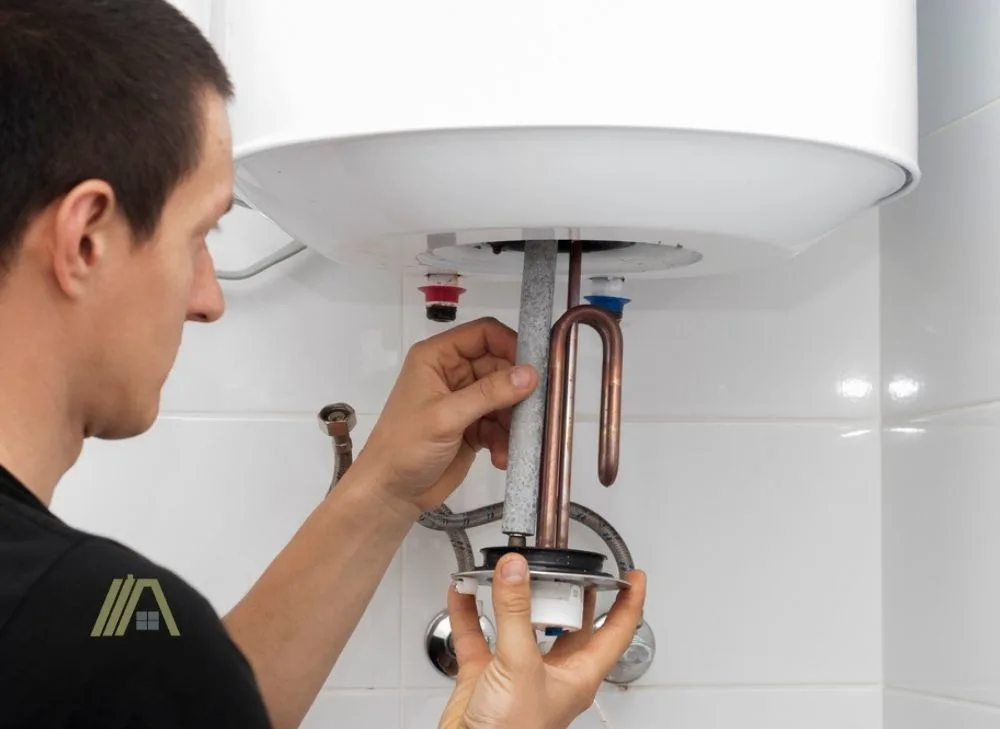
However, glass-lined tanks are at risk of suffering from the corrosive elements in the water. Hence the need for anode rods.
Anode rods are metal rods that run down the center of the tank and protect the interior of the tank from corrosion and rust. The mechanism of action depends on what type of anode rod is used.
There are two types of anode rods:
- Sacrificial anode rods
- Powered anode rods.
Sacrificial anode rods are made of reactive materials like aluminum, magnesium, and aluminum/zinc alloy. Powered anode rods on the other hand are made from sturdier materials like titanium and mixed metal oxide.
The reason why sacrificial anode rods are made from more metals is that their job is to attract the corrosive elements in the stored water. They degrade so that the water tank does not. As a result, sacrificial anode rods only last about 3-5 years.
To improve the life of your heater, it’s advised that a maintenance check be done on the sacrificial anode rod yearly and that the rod is replaced when it has depleted up to 50%.
Failure to replace the anode rod at this stage leaves your water heater tank open to corrosion and if this remains the case for long, your water heater tank would continue to corrode and eventually start leaking.
Powered anode rods use an electric current to prevent corrosion. They are not designed to degrade and so they can last up to 7-15 years.
The Temperature of the Water
Most water heaters have a default setting of 140 °F. However, the recommended temperature by the U.S. Environmental Protection Agency is 120 °F.
Using a higher temperature than this doesn’t only increase your energy bill, it also puts you at risk of scalding and can cause damage to your water heater tank as well as connecting pipes and valves.
Moreover, one of the primary causes of water heater leaks is corrosion. The risk of corrosion increases exponentially when you run the heater at temperatures above 130 °F.
Running your heater at extremely high temperatures encourages mineral build-up and it also increases the damage caused by hard water.
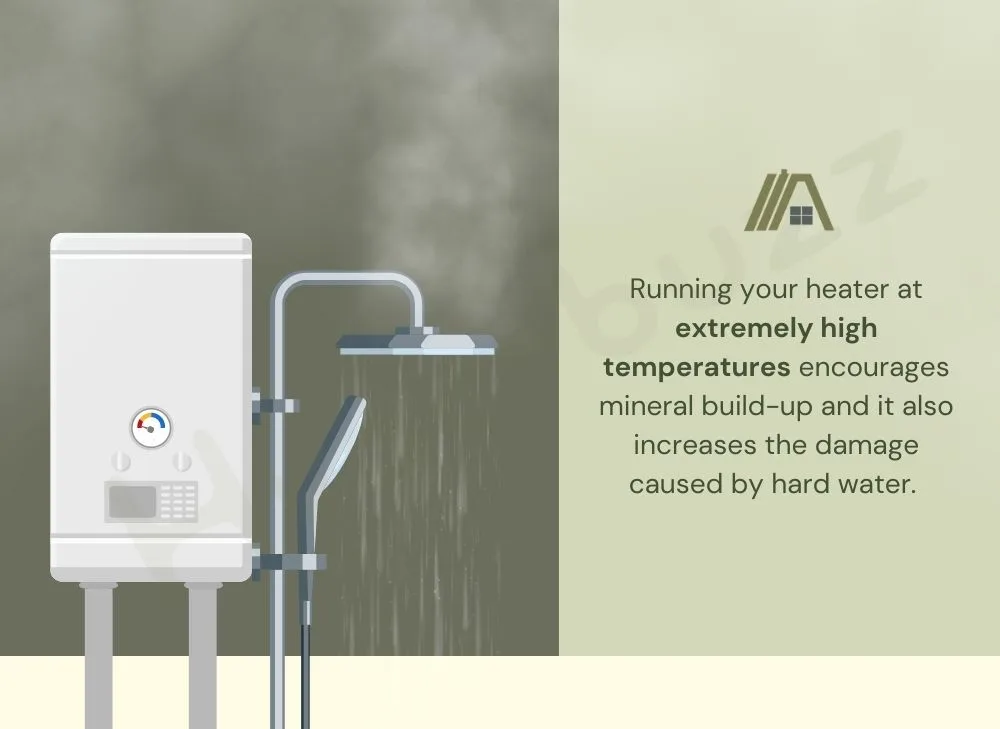
If minerals continue to build up over a period of time, they attach to the body of the water heater and put a strain on the heater components. If this continues for a prolonged period without maintenance checks, it would eventually lead to the breakdown of the unit.
Frequency of Use
The frequency of use usually influences the lifespan of appliances and water heaters aren’t an exception.
High demand for hot water means that your water heater has to continuously work to provide you with heated water and this is applicable in both tankless and tank water heaters.
Depending on the heat source used by your unit, persistent usage of a residential water heater can cause the breakdown of water heater components and also reduce the heater’s lifespan.
Lower demand for heated water means that the unit doesn’t have to work so hard and this would increase your water heater’s life span in the long run.
Another thing that is influenced by how often you run your water heater is your energy bill.
Water Hardness
Hard water can reduce the lifespan of a water heater by up to 2 years. This is because hard water contains excess minerals, prevalently calcium and magnesium.
The mineral build-up caused by hard water can increase energy usage, clog pipes, reduce the heater’s efficiency, and lead to the breakdown of the water heater.
As I stated earlier, hard water becomes a bigger problem when the water is extremely hot. This is because heated temperature encourages mineral separation and when this happens, they settle at the bottom of the water heater tank. A continued buildup of these minerals can obstruct the activities of the heat exchanger, causing the unit to work extra hard to heat water to your desired temperature.
The minerals can also build up on the anode rod, reducing its effectiveness.
The build-up of minerals means that the heater would constantly require repairs and maintenance and if it is left unattended, it would cause the eventual breakdown of the unit.
Location of the Water Heater
Water heaters serve the primary purpose of heating and supplying heated water. So, to ensure the optimal performance of the heater, it is best to install the unit in a temperature-conditioned location.
With that said, water heaters that are situated in unconditioned locations, for example, a chilly crawl space or garage, are at risk of breaking down before one that is installed in a conditioned area.
This is because the contrasting external temperature would force the unit to work extra hard to maintain your desired water temperature. The constant strain on the unit would force it to break down earlier than it should.
If you put your water heater in a damp location, the external portions of the tank will also be exposed to water. There are fewer protective measures in place for the external side of the tank because it is not supposed to come into contact with water regularly.
This means that your water heater may start to rust from the outside in.
Installation Quality
The installation quality of the water heater plays a role in determining the unit’s efficiency as well as its lifespan. This is why it is recommended that you reach out to a professional to install appliances like water heaters.
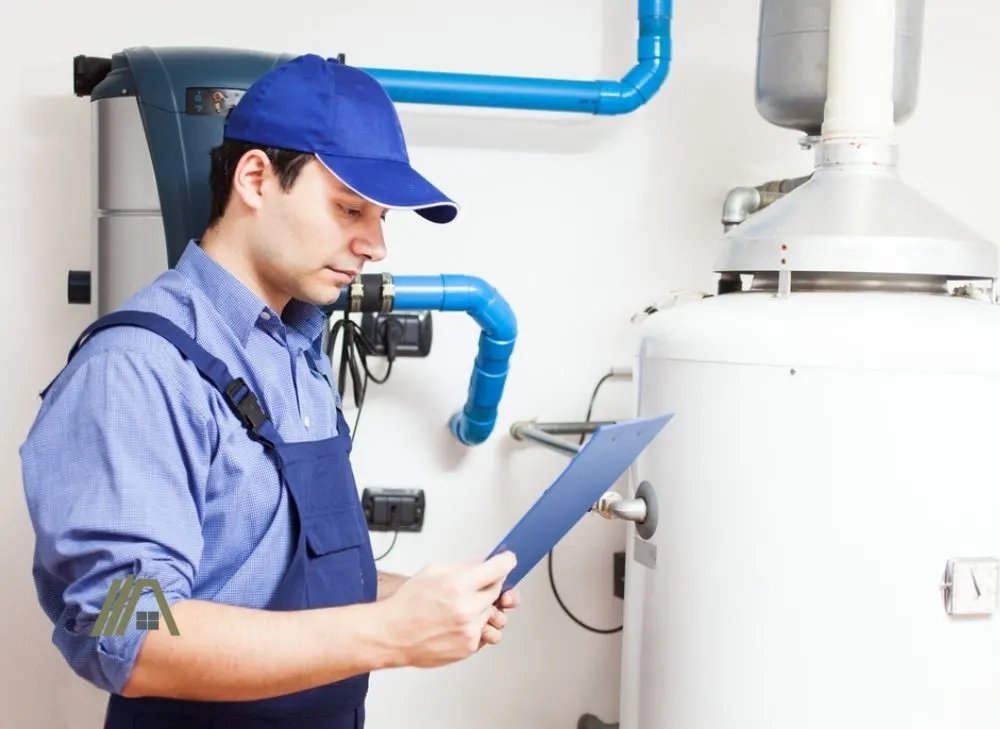
Water heaters are supposed to be installed according to manufacturer instructions as well as plumbing codes. Here are some things to look out for:
- Proper piping connections.
- Proper installation of pressure valves and discharge tubes.
- Usage of appropriate installation materials.
- Right installation procedures are followed.
- The tank itself isn’t bashed or mishandled during the installation process.
A poorly installed water heater would most likely have a shorter lifespan than one that is correctly installed.
Level of Maintenance
The durability of your water heater is also influenced by how much care the unit receives.
For an efficient and long-lasting water heater, it is advised that you perform frequent maintenance checks on the unit.
By committing to routine water heater maintenance, you ensure that faults are discovered before they cause lasting damage to the unit. That’s why well-maintained water heaters often last longer than their proposed lifespan.
Some people only pay attention to their unit when a water heater component is in need of repair. If this is the case, your water heater would most likely break down earlier than it should because the neglect would eventually lead to problems that cannot be fixed by a technician.
How to Properly Maintain a Water Heater
We’ve established that proper and consistent water heater maintenance improves its efficiency and life span. Here are some maintenance procedures that would help you increase your water heater life.
- Set the heater temperature to 120 °F. This temperature setting is just right and can meet your needs without causing scalding or damage to the water heater tank and its other elements.
- Flush the water heater and wash out sediments at least once a year. However, hard water expedites the build-up of minerals, so if you have a hard water supply, it’s advised that you flush the water heater every six months. This removes sediments and debris that would otherwise put a strain on the heater. It also reduces the risk of corrosion and rust.
- Test the temperature/pressure-relief (TPR) valve annually. The TPR valve detects dangerous temperature levels and pressure buildup in the water heater and automatically opens to relieve the heat and pressure in the heater. If the pressure builds up and the valve isn’t functioning, it could cause the heater to break down, or worse it can cause your water heater to explode!
- Replace the sacrificial anode rod every 3-5. However, if you use a water softener, you will likely have to replace the rode before the 3-year mark because water softeners cause anode rods to deteriorate faster. Also, if you are performing your routine check and notice that the rod is covered in calcium or that it has depleted to 1/2″, I advise that you replace the anode rod.
- Insulate the water heater and pipings. Insulation prevents heat loss. So, while uninsulated units work extra hard to make up for heat loss and provide your desired water temperature, well-insulated water heaters put less strain on the unit.
- If your home features low-quality water, you can install a sediment filter in tankless water heaters. This will prevent debris and impurities from entering the tank. However, if you decide to install a sediment filter, it should be noted that the filter needs to be replaced monthly.
- For optimal water heater performance, have a professional conduct a routine maintenance check on the unit at least once a year.
Signs that Your Water Heater is in Need of Replacement
- The water heater produces irregular sounds.
- The unit takes longer to heat water.
- Drop in water temperature.
- Water pooling around the base of the heater.
- Discolored water.
- The heater takes longer to heat water.
- The water heater stops supplying hot water.
However, these signs could be caused by faults that can easily be repaired by a professional. So, it’s best to explore other solutions before proceeding to purchase a new water heater. If you do decide o purchase a new heater, then look into taking your old one to the metal recyclers.
Sources
https://bradburybrothers.com/blog/average-life-expectancy-tankless-water-heater/#
https://www.energy.gov/energysaver/tankless-coil-and-indirect-water-heaters
https://bexleyhotwater.com.au/what-are-the-differences-between-direct-and-indirect-water-heaters/
https://www.petro.com/resource-center/tankless-hot-water-heaters-vs-tank-storage-water-heaters#
https://americanhomewater.com/how-long-do-water-heaters-last-what-to-expect/
https://www.nebraskyplumbing.com/everything-you-need-to-know-about-a-water-heater-anode-rod/
https://www.billygo.com/blog/why-you-shouldnt-install-a-water-heater-yourself/#:
https://www.gopreferred.com/blog/what-temperature-should-my-water-heater-be-set-to/#
https://www.sbplumbingutah.com/9-tips-for-effective-water-heater-maintenance/
https://www.theyesmancan.com/plumbing/plumbing-faq/life-expectancy-water-heater/#
https://restorationmasterfinder.com/restoration/6-factors-affecting-your-water-heaters-lifespan/

